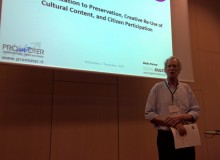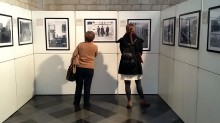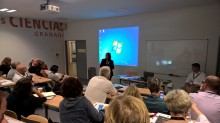It is of the utmost importance that the context of change generated by the advent of digitization and digital technologies, and its implication on the society at large, are discussed in as many occasions as possible. DISH2015 conference is a perfect place for discussing the many challenges faced by cultural institutions, and the needs they have to make strategic decisions about their activities and services. The key aims of the conference were inspiration, knowledge, skills, innovation and networking.

So, following the good feedback recently received in similar gatherings, once again Europeana Space, RICHES, Photoconsortium and Civic Epistemologies joined forces to progress on the analysis on the impact that the impressive amount of digitized cultural heritage (DCH) in Europe has, by making cultural heritage more accessible and by generating benefits to the content owners.
It’s important to assess the sociological impact and the context of change brought in by digitization and digital technologies: how DCH participate in the community-building processes and social cohesion of the “new” European society? How can DCH help cultural institutions to renew and be closer to the society and the education sector? And how can DCH be re-used to unlock its business potential fostering economic growth? Crucially, generating new employment and economic rewards by leveraging on DCH needs the development of strategic alliances between sectors and actors which are not used to work together.
Further, digitization has been so far a matter mainly for archives and memory institutions, but cultural heritage is also in the hands of private citizens (e.g. early photography). It is needed a more participative approach so that smaller archives, individuals, collectors have the possibility to access digitization facilities, training and services. This can pave the way for EU citizens to play a co-creative role and participate in the research on cultural heritage and digital humanities. Next to that, we see examples of how the accelerating pace of IT developments and its usage by ordinary people is going far beyond society’s ability to make sense (and make sensible decisions) of what is ‘right’ and what is ‘wrong’ within the context of existing legal and moral codes.
Neil Forbes from Coventry University, Fred Truyen from KU Leuven, Lizzy Komen from Sound & Vision and Bart Bonnevalle from Noterik were warmly welcomed in a full room and discussed about these topics fostering interaction and networking with the audience. The slides of the presentations are available for download (PDF, 3.2 Mb).

More information about DISH: www.dish2015.nl












 If you have interesting news and events to point out in the field of digital cultural heritage, we are waiting for your contribution.
If you have interesting news and events to point out in the field of digital cultural heritage, we are waiting for your contribution.
























